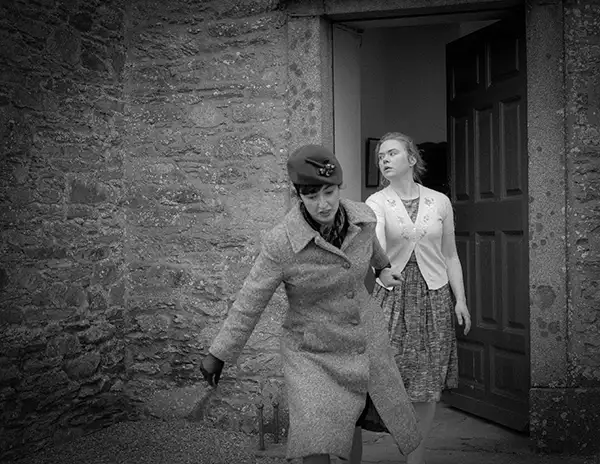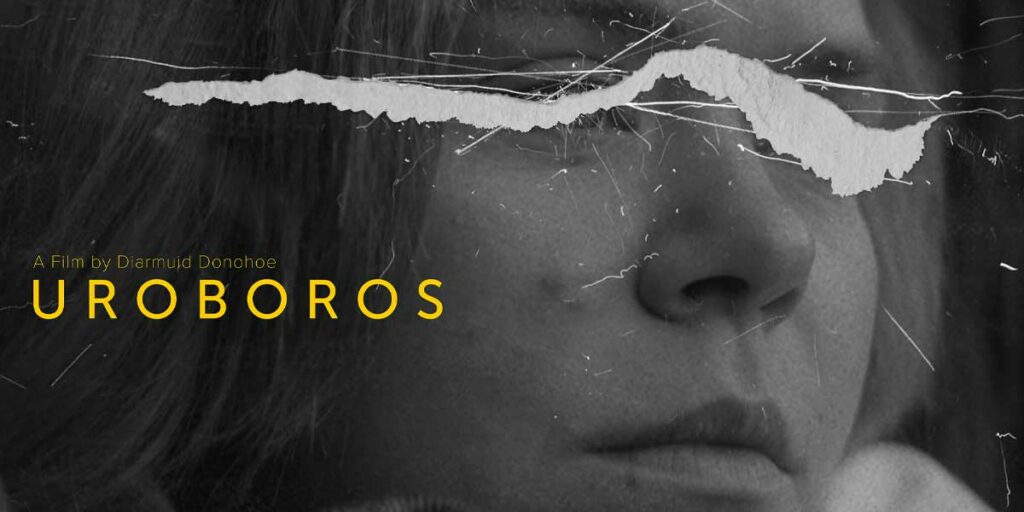Diarmuid Donohoe masterfully employs the ancient symbol of the Uroboros to tell his tale of cyclical family trauma inspired by true events.
The ancient symbol of the “uroboros” depicts a snake or dragon consuming its own tail, signifying nature’s infinite loops. In Diarmuid Donohoe’s newest short film, Uroboros, the title, is used to illustrate how history, more specifically familial trauma, has a cyclical nature.
Uroboros tells the story of Moria (Emma Dargan-Reid), a free-spirited young woman living in 1950s Ireland who is admitted to a mental institution against her will by her abusive father (Brian Fortune).
It is evident Donehoe trusts his audience enough to understand the artistic vision and nuance within the short; however, the central relationship between Moria and her father leaves more to be desired, which takes away from the effectiveness of the short film. Uroboros fails to dive into the dynamic between Moria and her abusive father nearly enough. Moria’s father serves more as a looming dark figure throughout the short film than an actual key player in Moria’s life. There’s a degree of understanding that is all Moria’s father has ever been to her, a looming figure rather than a present caretaker, but the disconnect between these two key characters leaves the audience with a longing to understand their dynamic on a deeper level.
Moria’s father condemns her for her free-spirited nature and the short hints this is a lesson her mother also had to learn. When her father decides to send Moria to the mental institution, her mother (Lacy Moore) pleads to let her stay and have her learn her lesson another way. However, while her mother doesn’t wish this fate upon Moria, she is unable to communicate her husband’s expectations of Moria in order to save her.
No matter how much Moria’s mother may want to defend her daughter, it is clear she is a victim of the same cycle of abuse as her daughter. When Moria has flashes of consciousness during her time in the mental hospital, she sees visions of her mother receiving the same treatments as her just a few hospital beds down.

Their relationship comes to heed when Moria’s mother strikes her after she shows up late to church barefoot. The expression on Moria’s face tells the audience all they need to know about the significance of this moment: while her mother has always gone along with her father’s ruling, she has never been physically abusive herself. Moria’s mother even shocks herself by her actions. While she knows better, she cannot go against her husband’s ruling and break this cycle of abuse. It is all she knows.
Donohoe’s short is masterfully shot, capturing the betrayal, abuse and confusion that Moria faces at the hands of her family’s decision to admit her. Emma Dargan-Reid portrays Moria beautifully, making every moment on screen count to show the cycle of abuse Moria has found herself trapped in.
The cinematography in Uroboros is a feat, shifting locations seamlessly from Moria walking through the forest to walking in the halls of the mental institution. Moria’s stream of consciousness is often interrupted as seen by flashes of her in the mental institution throughout the short, allowing the audience to experience the confusion that Moria must be experiencing from her treatment while she tries to understand how she ended up in the institution in the first place.
Uroboros is not a perfect short, but it’s one made with a degree of passion and care that is undeniable. It’s clear this story is deeply personal to Donohoe and he does a glorious job of telling it with care and sensitivity that demonstrates the magnitude of the tragedy of what happened to the real women of Ireland who were wrongfully committed to mental institutions.
Uroboros will be screened at the Irish Film Festival London on November 18, 2023 as part of the festival’s Screen Ireland Shorts Programme.

